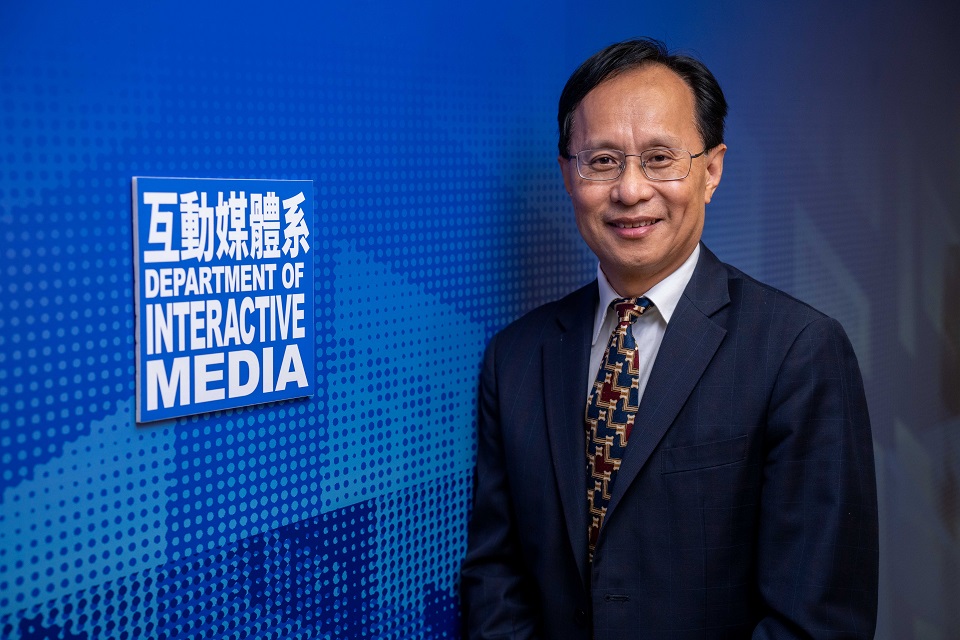Discover HKBU
Charting a new course for interactive media
28 Feb 2023


A passion for helping others is central to the life and work of Professor Zhong Bu, Head and Professor of the Department of Interactive Media (IMD) at HKBU. He began his time at the University last September, and he has hit the ground running ever since, leading a diverse team of faculty members to drive interdisciplinary research and nurture students to be the next generation of communication professionals who have a deep understanding of digital technology and interactive media.
Nurturing communication leaders of tomorrow
Professor Zhong took the helm of IMD at a time when the interactive media industry has undergone transformative changes along with the development of new digital technologies. To meet the emerging needs of society, HKBU’s School of Communication launched IMD last year, with the aim of developing academic and research excellence across disciplines spanning communication, media studies and informatics.
IMD offers the Bachelor of Communication (Honours) in Game Design and Animation Major programme, which is the first-of-its-kind programme in Hong Kong, but to Professor Zhong, the programme does much more than solely training students to become game designers or animators.
He says: “Establishing the Department of Interactive Media is a visionary strategy. Besides game design and computer animation, our curriculum also underscores the importance of communication theories and human-centred design. Our students will be equipped with the essential skills that enable them to become communication experts, who can effectively connect with and deliver messages to target audiences.”
As effective communication is crucial in today’s digital world, he believes that the programme offered by IMD can empower students to harness the latest digital media technologies to advocate for change in society and to take up positions in the creative and technology industries.
Apart from classroom learning, IMD provides students with a wide range of activities to enrich their learning experience. This May, senior students will embark on an overseas study programme to learn about game design and development in Japan. They will be able to immerse themselves in a new culture, explore the gaming industry and gain invaluable insight on how the professional world of gaming operates. In addition, the Department is collaborating with community partners in Hong Kong, including the Central Market, to give students practical experience in designing and developing animations for social innovation.
A heart for helping others
Throughout Professor Zhong’s professional life, the desire to help people has always been a major focus in whatever he does. Before joining HKBU, Professor Zhong spent extensive time as a communication scholar and educator in the United States. He was a tenured Professor at the Donald P. Bellisario College of Communication and an affiliate professor at the College of Information Sciences and Technology at Pennsylvania State University, where his research focused on information processing and its effects on human behaviour, cognition, mental health and social well-being.
Talking about what motivates him to pursue research in information processing, Professor Zhong says, “People behave based on what they believe in, and their beliefs are related to how they process information. Our information processing capability can determine our career development, life satisfaction and well-being. This is a very important topic and I want my research to be able to help people.”
In a study that was recently published in International Journal of Information Management, Professor Zhong examined the characteristics of health news distribution and discussion by analysing health news reports that were published over a 10-year span and around 50,000 Twitter posts responding to the news stories. “This project contributes to our understanding of the distribution of health misinformation. Although we are not medical experts, we as communication researchers can profile health misinformation based on sentiment analysis and its mechanism of dissemination on social media. This enables us to draw practical implications that help the public and healthcare professionals identify and fight health misinformation,” he says.
Organising summit to discuss AI development
Looking ahead, he will investigate the impacts of the COVID-19 pandemic and secondary traumatic stress. “People’s exposure to the health crisis may have caused secondary trauma. We must address secondary trauma so that we can help people build resilience and return to a normal life.”
Professor Zhong spares no effort to advance knowledge sharing and facilitate academic exchange. As Head of IMD and Senior Editor of the international journal Computers in Human Behavior, he spearheaded the planning and organisation of the “Summit of Artificial Humans” to be held in March on HKBU’s campus. The event will bring together leading researchers and experts to discuss and explore the future development of artificial intelligence (AI).
He particularly wants to incorporate a social perspective in the discussion of AI development. He believes that everything from communication and social sciences to the arts has a place in AI and makes unique contributions, and he hopes to instill in students the same desire to contribute to society regardless of one’s background. “Where you come from is not important. It is what you do that matters. Regardless of where you go, if you can add value to other people, to your work, to society, you become valuable,” says Professor Zhong.